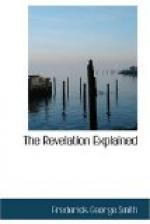necessity of praying for the emperors, and for the
continued state of the empire; because we know that
dreadful power which hangs over the world, and
the
conclusion of the age, which threatens the most horrible
evils, is restrained by the continuance of the time
appointed for the Roman empire. This is what
we would not experience; and while we pray that it
may be deferred, we hereby show our good-will to the
perpetuity of the Roman state.” In a subsequent
chapter it will be seen that Pagan Rome, broken up
into minor divisions and no longer able to maintain
her position in the political world, resigns her power
and authority into the hands of the rising Papacy.
Therefore it is not surprising that the means by which
this great change is effected should be made the subject
of prophetic revelation. Besides, we have other
things to guide us in the interpretation. We can
readily identify the symbols under the fifth trumpet
with the curse of Mohammedanism in the Eastern empire,
and we would naturally suppose that the first four
precede those. Again, the symbols are all drawn
from the natural world, which leads us assuredly into
the political affairs of the empire for their fulfilment.
They are also of the most destructive nature, therefore
we look for objects of a corresponding desolating
character. Finally, the vision of the preceding
chapter represents fierce, destructive winds as about
to descend upon the earth, being temporarily held
in check to give opportunity for the primitive establishment
of Christianity, implying that they would afterwards
be let loose to burst like a tornado upon the empire.
It is said positively that power was given “to
hurt the earth and the sea” (chap. 7:2), and
in the vision before us the effects produced upon
the earth and the trees are particularly detailed.
“The earth” signifies the Roman empire,
or that portion of the earth made the subject of apocalyptic
vision. That this application of the word earth
is correct, is shown by various Scriptures. “And
it came to pass in those days, that there went out
a decree from Caesar Augustus that all the world
should be taxed.” Luke 2:1. “The
queen of the South ... came from the uttermost
parts of the earth [southern Arabia] to hear the
wisdom of Solomon.” Mat. 12:42. “Ye
shall be witnesses ... unto the uttermost part
of the earth.” Acts 1:8. The apostles
carried the gospel personally, only throughout the
territory of the then-known civilized world—the
Roman empire. Upon this earth there descended
in the vision before us a fierce storm of hail and
fire, mingled with blood. Its being mingled with
blood would indicate its destructive effects.
One characteristic of this symbol particularly is worthy
of notice. Hail and fire cast upon the earth
would become absorbed speedily or pass into new combinations
with the surrounding elements, thus not remaining
in any permanent form except in its effects. In
this particular it is wholly unlike the symbol of
the next trumpet, which is that of a burning mountain
cast into the sea, for such a body would naturally
remain permanently where it fell; whereas a storm of
hail and fire would soon disappear. Also, the
statement that this storm was cast upon the earth
would indicate that it was a calamity descending from
without upon the empire.




